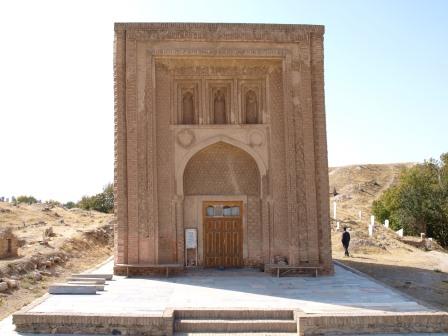13th October 2014 Tashkent, Uzbekistan
Tourism


Last Thursday I joined other Tashkent Ambassadors in a visit to Samarkand to hear President Karimov’s speech at the opening of the 99th Executive Council session of the World Tourism Organisation. The president spoke about the value of tourism as a means of encouraging contact and understanding between nations, and about the rich history and culture of Uzbekistan.
After the conference I decided to do some practical tourism of my own, and on Friday I went out of Samarkand to the village of Tim, which is home to the Arab Ata mausoleum, recommended by one of my guide books for its decorated porch – the earliest know example of its kind – and its trilobe squinches.

Those sound like a magical creature from the Harry Potter books, but in fact they are an architectural feature that enables a round dome to stand on a square base. It’s an attractive building, dating from the late 10th century, though it’s not clear who was the Arab Ata – “Arab father” – it commemorates. It has some similarities with the more famous Ismail Somoni Mausoleum in Bukhara. It was a lovely journey out along the edge of low hills, through dry country where sheep and goats grazed the sparse vegetation.On the return journey I stopped to visit the cave of David, in the Mirankul mountains south of Samarkand, where according to legend King David pulled the rock apart with his hands to escape from his enemies. 1,303 steps lead to the top of the mountain, where there are stunning views of the surrounding hills, and one then has to descend another 200 steps to get to the cave. I met a few dozen others, climbing the steep stairs, visiting the cave, or resting at the summit, but I think I was the only foreigner there.
And on Tuesday this week I attended a forum in Tashkent, co-organised by the British Council with representatives of colleges and universities providing training in skills for tourism, and of commercial organisations, to talk about co-operation between private sector operators in tourism and academic institutions. In a country like Uzbekistan, that to many foreigners – certainly many British people – is distant and mysterious, if tourism is to be encouraged it’s important that visitors have easy access to the information and the services they need – support and advice, accommodation and transport and so on. There’s a lot of room for further development of private business in the sector. At the moment only around three thousand British tourists visit the country each year, though the numbers are growing. I hope we’ll see more. I know from my own experience how much there is to do and see here.
45, 46, 57 words in a single sentence – is it some kind of a diplomatic language or? 🙂
Anyway, it is interesting, thank you.
Thanks for the comment. I’ll try to keep my sentences shorter!